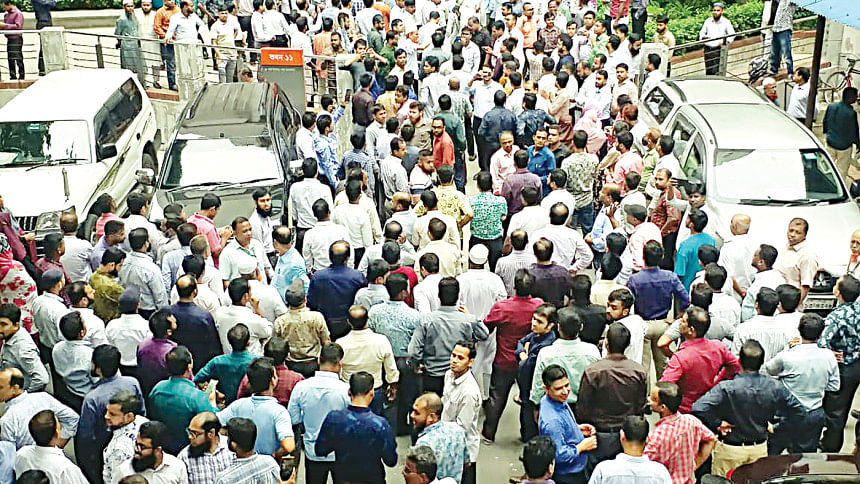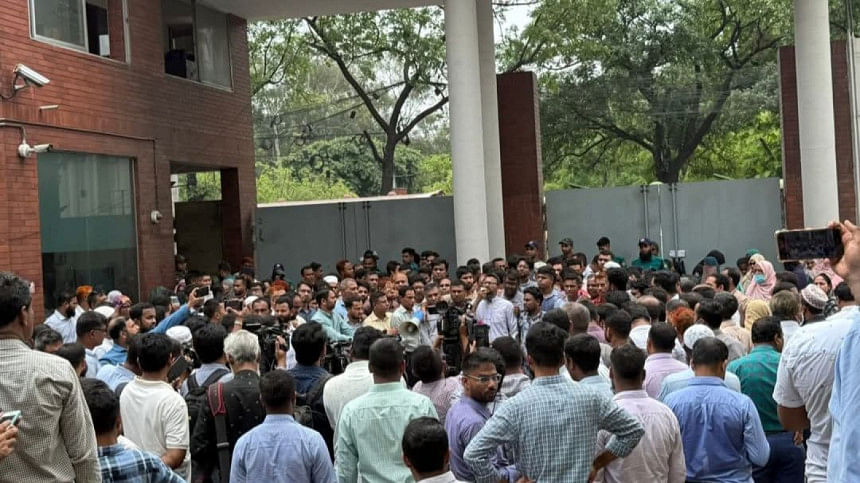Public Service Act: Ordinance out amid Secretariat protests

The government last night issued an ordinance allowing dismissal of public servants for administrative disruptions within 14 days and without departmental proceedings.
The Public Service (Amendment) Ordinance, 2025, was gazetted hours after employees protested the move at the Secretariat, four days after the advisory council approved its draft.
One employee leader told The Daily Star that they would discuss the next course of action today, while another said they would resume protests this morning.
The protesting employees said they were left in the lurch despite demonstrations inside the Secretariat for the second consecutive day yesterday, and even after meeting four advisers.
Yesterday's protests lasted from morning until 1:30pm. Officers and staffers started gathering in front of building No. 6 at the Secretariat's Badamtola at 9:30am. After around an hour, members of the Secretariat Officers and Employees Joint Council, brought out a procession and marched through the Cabinet Division, the new building, and the clinic building, before stopping at building No. 11. After a brief stay there, the procession circled various areas of the Secretariat.
Protest leaders met with Housing Adviser Adilur Rahman Khan, Home Adviser Jahangir Alam Chowdhury, and Commerce Adviser Sk Bashir Uddin. However, no solution was found.
Home Adviser Jahangir told reporters at his ministry, "The Awami League government amended the Government Service Act in 2018 to manipulate the election. Now, the government feels it is necessary to amend the law again. However, if employees have any concerns, a decision will be made through discussions."
The ordinance, an amendment to the Public Service Act, 2018, revives provisions of the Government Servants (Special Provisions) Ordinance, 1979, though in a slightly relaxed form.
Sources in the public administration ministry said the government introduced these amendments to streamline disciplinary action for civil servants, as the current seven or eight-step process creates a broad scope for lobbying.
The protesters, however, argue that the amended law empowers the government to punish any staff member arbitrarily without giving an adequate chance for a defence. They also allege the ordinance will disproportionately affect non-cadre employees.
Asked about the prompt issuance of the ordinance, Public Administration Secretary Mokhles ur Rahman told The Daily Star last night that it was done on government directive. "There is no reason for any employee to panic. I want to assure everyone that the ordinance will not be applied indiscriminately," he said.
A government official involved in drafting said the advisory council extended the disciplinary timeline to 14 working days from eight days recommended initially. Unlike the 1979 law, the ordinance allows employees to appeal in court.

THE ORDINANCE
If any government employee engages in any activity that causes disobedience among other government employees, disrupts discipline, or obstructs the performance of duties, it will be considered misconduct.
The other types of misconduct listed in the ordinance include remaining absent from work collectively or individually without leave or any reasonable cause; refraining from performing duties; inciting or provoking others to abstain from work or refrain from discharging their duties; or obstructing any employee from being present at work or performing their duties.
Under the ordinance, employees found guilty of misconduct may be demoted, removed, or dismissed from service.
A show-cause notice must be issued within seven working days of initiating proceedings. If the accused fails to respond or is found guilty, a second notice must be served within another seven working days, asking why the proposed punishment mentioned in the notice should not be imposed.
If the accused again fails to respond or is found guilty, the stated punishment may be imposed.
The ordinance allows notices to be sent via email, in addition to existing methods.
Punished employees can appeal within 30 working days. The appellate authority may uphold, cancel, or amend the decision. A review petition may also be filed with the appropriate authority or the president within the same period.
Secretary Mokhles said, "The government wants to carry out its state responsibilities swiftly. This amendment aims to ensure quick action in cases where anyone obstructs the discharge of such responsibilities."
No provision to scrap the rule allowing forced retirement of an employee after 25 years in service was included in the ordinance despite the recommendation of a reform commission.
"Since these recommendations have not yet been formally implemented, the provision has not been included in the ordinance at this stage," Mokhles said.
Nazrul Islam, general secretary of the Inter-Ministerial Employees Council, told The Daily Star last night, "The government has moved faster than we expected. So, we will discuss tomorrow [Monday] morning whether to proceed with our previously announced programmes."
Badiul Karim, convener of the Secretariat Employees United Council, told The Daily Star around 10:30pm, "Despite the ordinance, a staff rally will be held at 11:00am on Monday at the Secretariat."
Responding to a query, he said: "Though there was talk of blocking the Secretariat's entrance gates, we believe that should not be done. A peaceful gathering will be held in front of Building 6. However, if the government does not respond to our demands, a tougher movement will be declared."

 For all latest news, follow The Daily Star's Google News channel.
For all latest news, follow The Daily Star's Google News channel. 





Comments